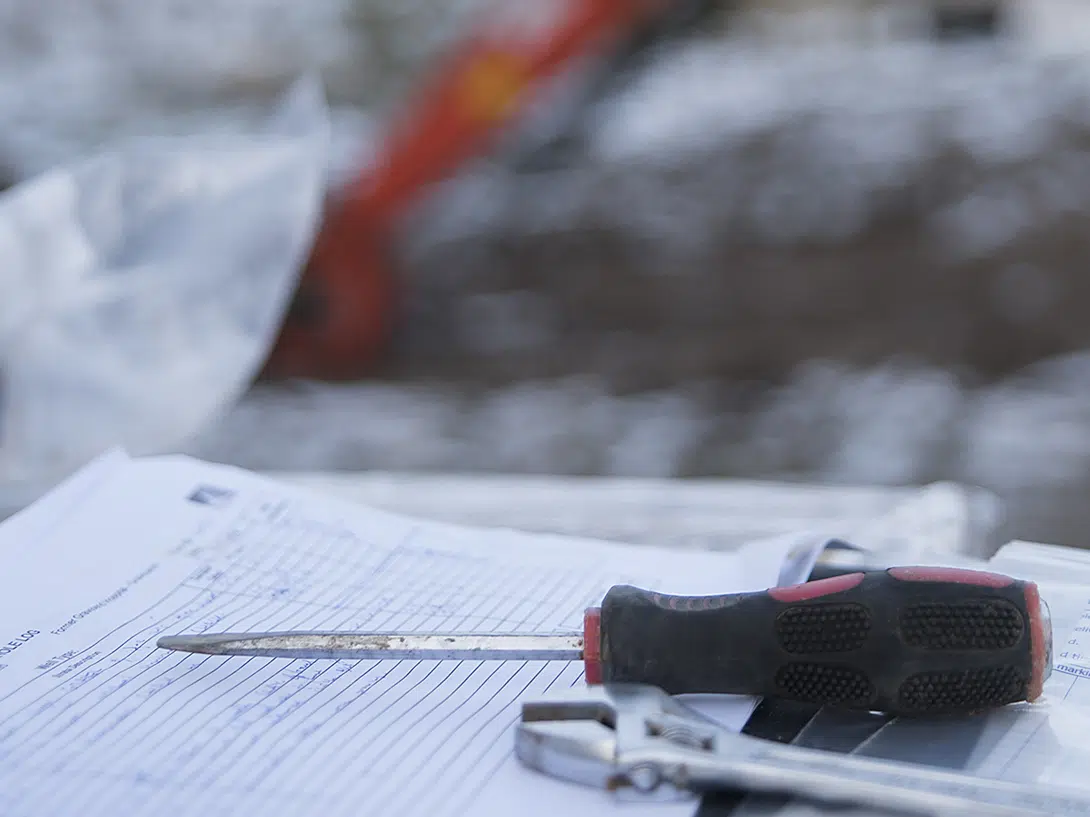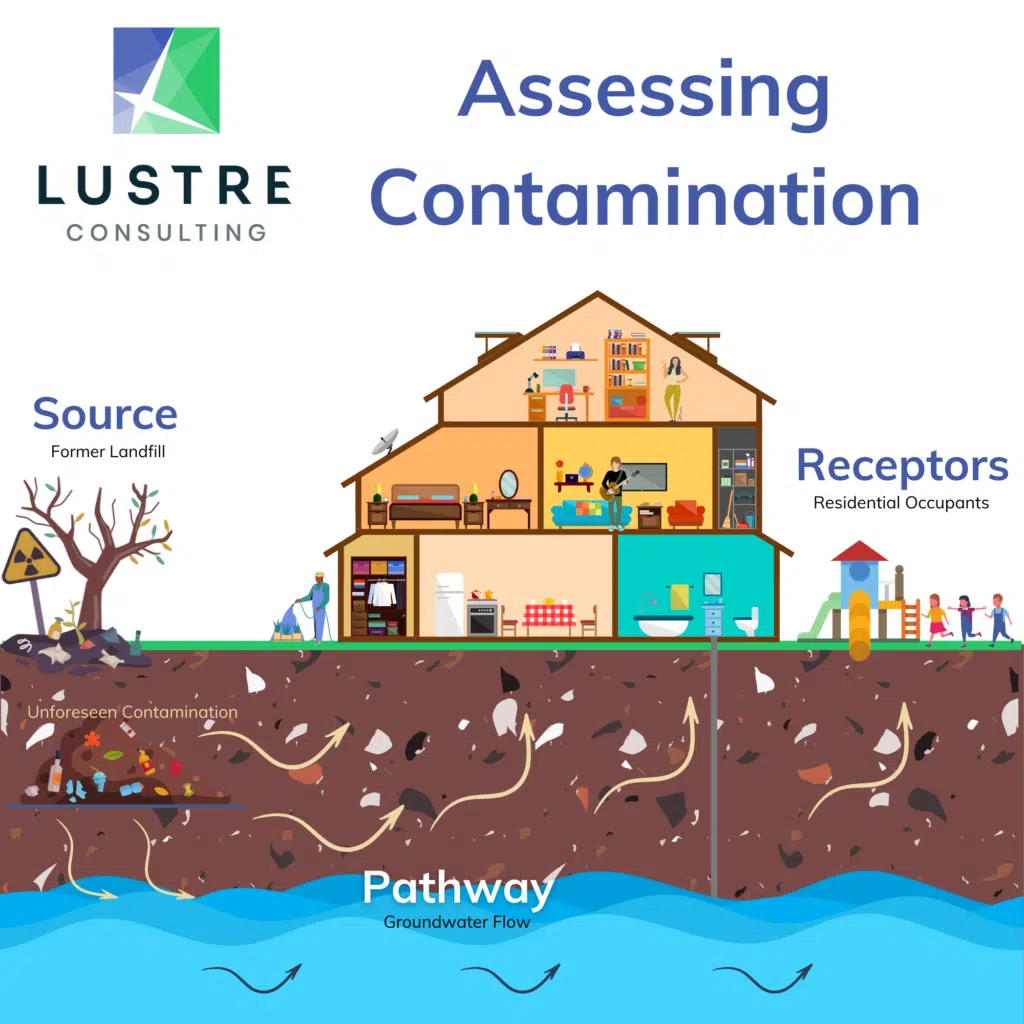
This is a question frequently asked by many of our clients. Especially on sites where there is not an immediately obvious industrial use or the site is not technically considered to be brownfield, such as agricultural land.
Contamination is not always something that can be seen; often contamination is invisible, buried below ground or is present in perfectly normal looking topsoil. In addition, contaminants can persist underground for decades or migrate from other industrial areas to the site of your next project.
But if you have a hydrocarbon odour, an oily sheen or green glowing soil, then it is obvious that you have a land contamination problem. But what if there are no visual or olfactory indicators of potential contamination? Then how do you go about ascertaining the type, spatial extent, and distribution of contaminants at a particular site?
At Lustre Consulting we use a variety of tools and techniques to assess the potential for contamination to be present onsite and follow a staged risks assessment approach to refine the level of risk. This give you the best understanding of contaminative status of each site. We use models to help estimate the likelihood of contaminants being present, as well as the potential risk they pose to humans, animals and plant life in the surrounding area, which are based on the source-pathway-receptor linkage.
There are three main questions we use to investigate contamination.

The source is where the contaminant has come from; this could originate from former potentially contaminative uses of the site such as a petrol filling station, a factory, agricultural barns and yards, former onsite demolition works. It can be sitewide or related to a specific point source such as a fuel tank. The source could also be an off-site land use, where contaminants have migrated onto your site via groundwater and cause groundwater below your site to be contaminated. Determining the source can be tricky and will require at least a detailed desk-based assessment to be completed to identify potentially contaminative on-site and off-site uses. Once a source has been identified, it can be better understood via intrusive site investigation.
This simply how a contaminant can reach a receptor such as people, buildings or groundwater and requires a detailed understanding of the underlying geology and hydrogeology. For example, contaminants could stick to soil particles, which are later brought to the surface through digging. A contaminant could be vapourised into soil gases and can migrate to the surface through soil pores and get trapped inside a basement, or can accumulate in soil or watercourses, or could dissolve into groundwater and be carried by the water to a nearby drinking water supply. If we are able to understand what pathways exist, then we can work out where a contaminant might go and how much of it there could be.
This is who or what will be affected by a contaminant. Receptors are identified based on an understanding of the current and future uses of a site. For example, will residential receptors be introduced following redevelopment, and will the dwellings have private gardens? Will drinking water pipes be introduced which could be vulnerable to degradation by hydrocarbons? Once you have identified your receptors, the next step is to determine whether the concentrations of contaminants present have the potential to cause the receptor harm. We can use scientific models which combine chemistry, toxicology and public health information to determine the amount of contaminant a receptor takes in and above what level the contaminant concentration can cause unacceptable harm. The concentrations present can be compared to these standards to determine what measures need to be taken in order to remove or reduce the potential for harm.
By applying the above methodology to every site, we can identify the potential for contamination to exist, its extent and therefore its potential to cause harm to identified receptors.
Even if the contamination is not immediately obvious, by gaining a detailed understanding of the conceptual site model, untimely and financially delays to projects can be avoided.
If you think you may require a Contaminated Land Assessment, contact us now to speak to one of consultants.
How we can protect your construction site from unnecessary delays and costs. If piling is part of your construction plans, a piling risk assessment could be a vital step to avoid potential problems that could disrupt your project, including: Piling risk assessments are now explicitly referenced within the Environment Agency’s Land Contamination Risk Management Guidance […]
How we can protect...
What is a Phase 1 Desk Study? A Phase 1 Desk Study will determine if contamination could be present at your site, and importantly, if that contamination poses a risk to future site users or the environment. Why is a Phase 1 Desk Study needed for this site? If the Desk Study finds that the […]
What is a Phase 1...
When you are looking for an Environmental Consultant, it is important to choose the right one to guide you through the process. At Lustre Consulting, we are committed to our core values of being: Supportive: To support our customers as best we can professionally and personally. Reliable: Going out of our way to deliver a […]
When you are looking...
In October 2020, the Environment Agency (EA) published a new set of guidance documents on the management of Land Contamination. Land Contamination Risk Management (LCRM) replaced the long standing risk assessment and remediation methodology set out in CLR11, which has been formally withdrawn. The assessment of land contamination as set out in CLR11 is widely […]
In October 2020, the...